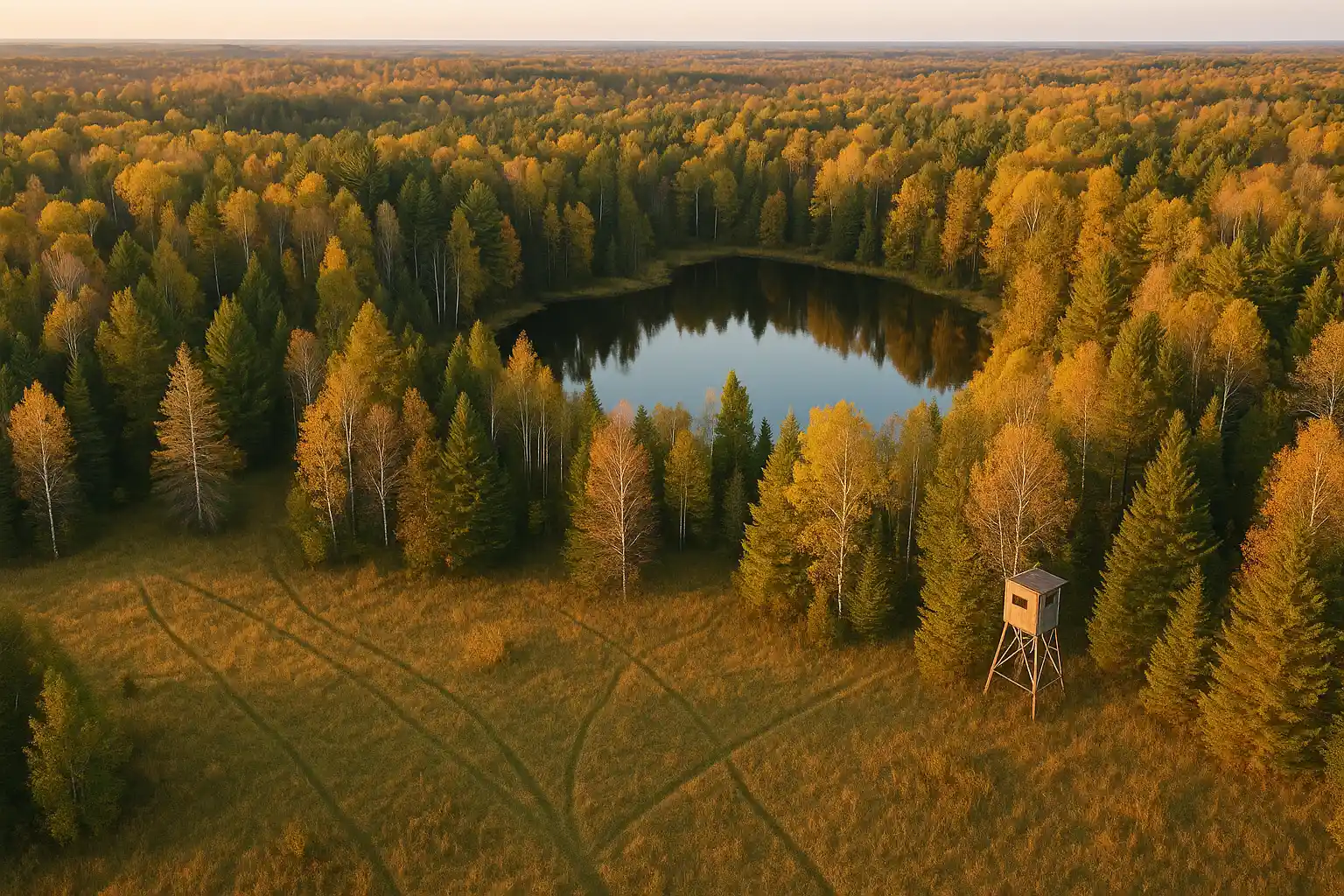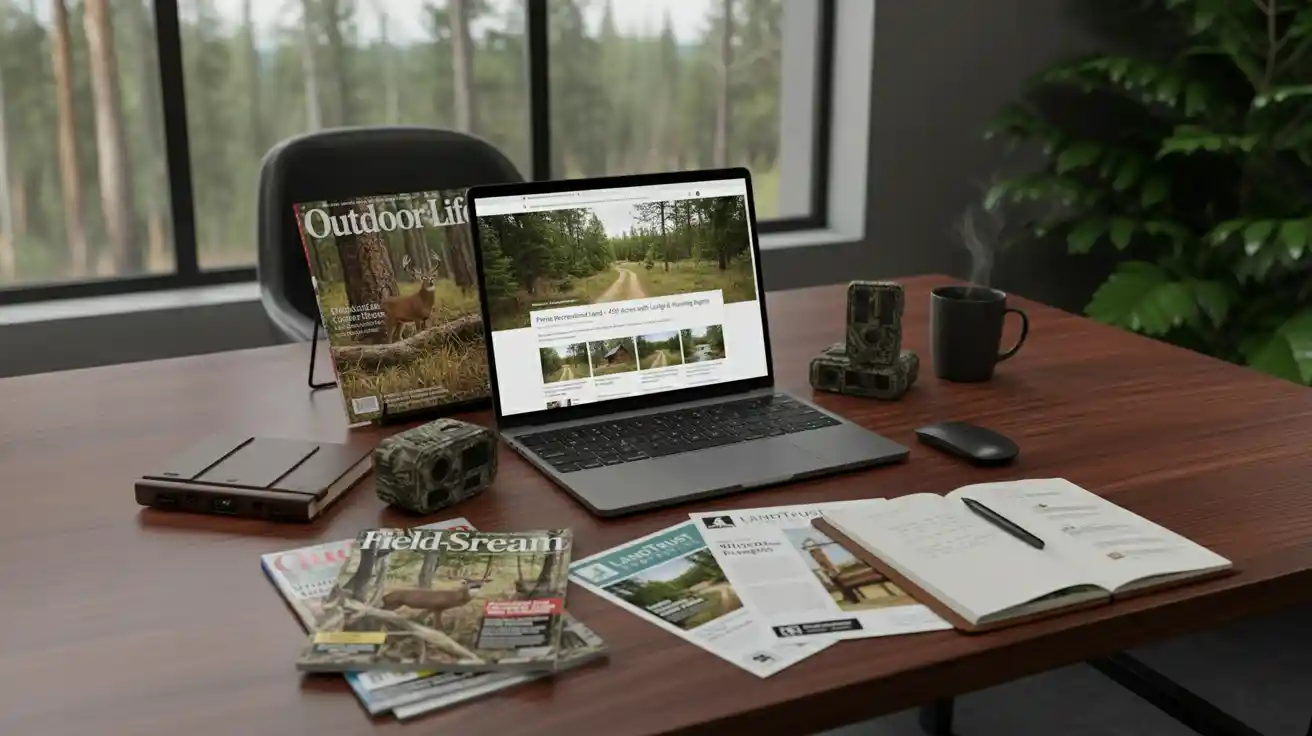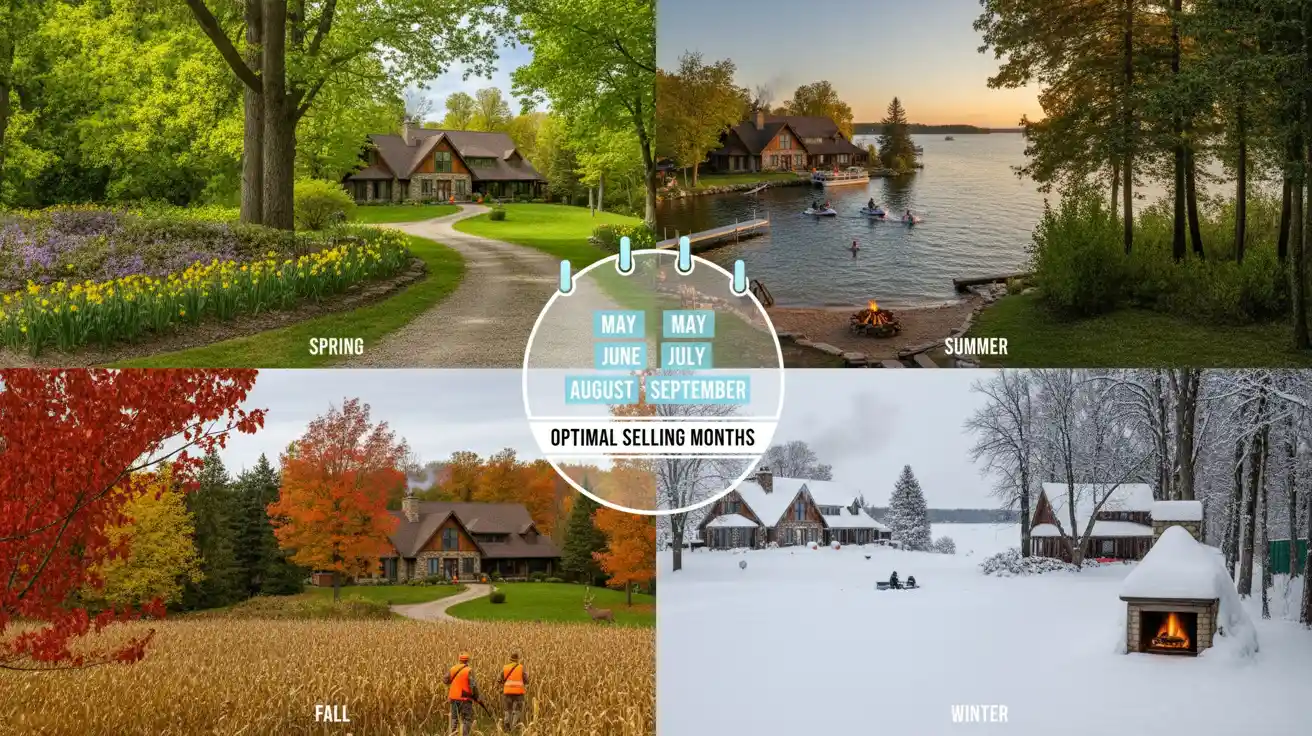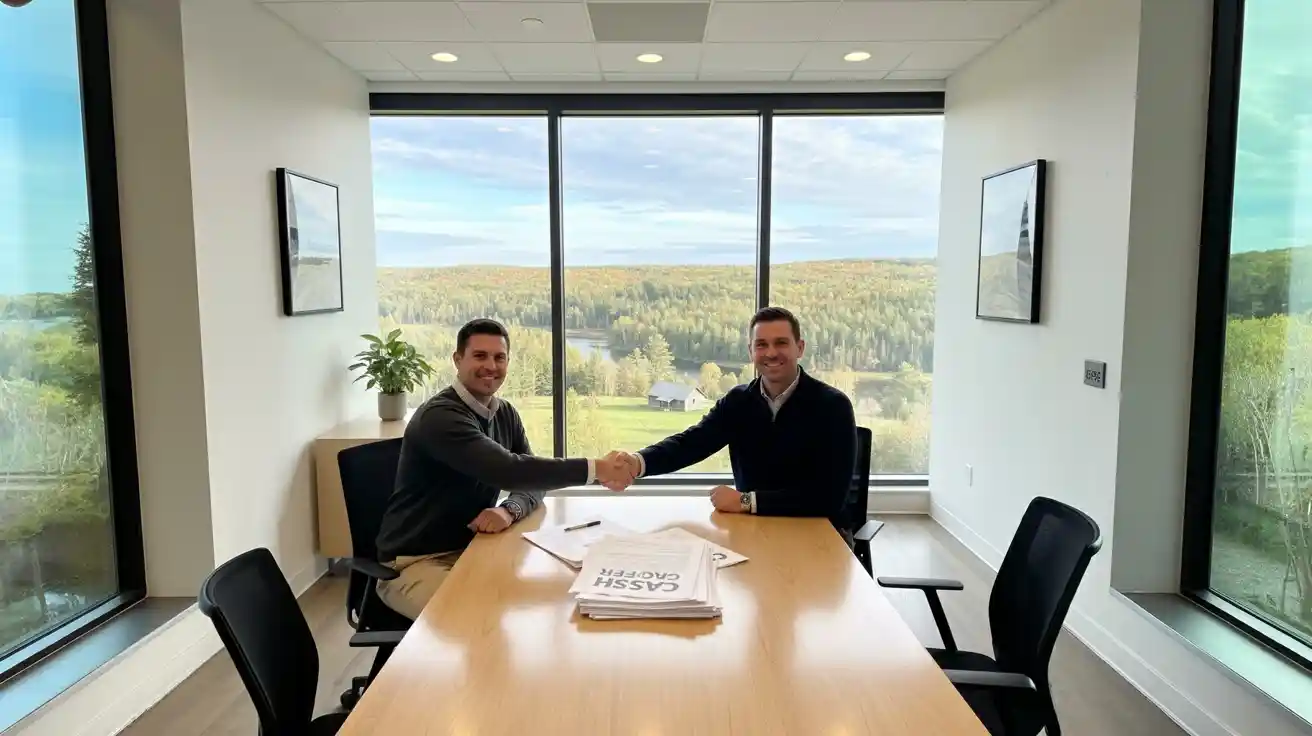Selling hunting and recreational land in Wisconsin requires understanding seasonal buyer patterns, specialized marketing channels, and unique valuation factors that differ significantly from typical real estate sales.
Wisconsin's 15,000+ lakes and excellent hunting opportunities create strong demand, but navigating conservation programs, financing challenges, and seasonal access issues requires expertise that most landowners lack. Let’s jump in and review the ins and outs of selling recreational and hunting land in WI!
Key Takeaways:
- Wisconsin recreational properties sell best when listed in late summer for hunting land and spring for lakefront properties to match seasonal buyer interest.
- Recreational land values depend on specialized factors like game quality, water access, and timber value rather than traditional real estate metrics.
- Cash buyers eliminate common recreational property sale obstacles including financing difficulties, extended timelines, and seasonal access limitations.
Quick Note: If you're looking to skip the traditional sales process, we buy Wisconsin land fast and can provide a free cash offer within 48 hours.

Understanding the Wisconsin Recreational Land Market
What Makes Wisconsin a Prime Recreational Land Investment
Wisconsin stands out as one of America's premier destinations for recreational property ownership. With over 15,000 lakes and 84,000 miles of rivers and streams, the state offers unmatched opportunities for hunting, fishing, and outdoor recreation. This abundance of natural resources drives consistent demand from both in-state and out-of-state buyers.
The numbers tell a compelling story:
- Recreational land values have increased 15-20% since 2023
- Wisconsin ranks in the top 5 states for hunting land investment returns
- Annual deer harvest exceeds 400,000 animals, indicating excellent hunting quality
- Northern Wisconsin leads the state in recreational property appreciation
Key Market Drivers in 2025
Strong Buyer Demographics:
- Out-of-state buyers from Illinois, Minnesota, and Iowa seeking weekend retreats
- Local hunters looking to secure private hunting grounds
- Investment buyers recognize the recreational land's appreciation potential
- Retirees planning future recreational use
Wisconsin's Recreational Advantages:
- Year-round outdoor recreation extends property utility beyond just hunting season
- Ice fishing culture keeps lakefront properties active through winter
- Conservation programs like CRP and Managed Forest Law provide tax benefits
- Strong timber markets add additional income potential to wooded properties
Current Market Conditions
The Wisconsin recreational land market remains robust despite broader economic uncertainties. Properties with quality deer populations and water access command premium prices, often selling 20-30% above agricultural land in the same area.
Regional Variations:
- Northern Counties: Highest demand for remote hunting properties
- Lake Country: Premium lakefront commands $500-$3,000+ per linear foot
- Central Wisconsin: Strong balance of hunting and agriculture appeals to diverse buyers
- Southern Counties: Proximity to major cities drives weekend property demand
For landowners considering a sale, understanding these market dynamics is crucial. You can research the Wisconsin land market by county data to see how your specific area compares to statewide trends. However, many recreational property owners find that navigating this specialized market presents unique challenges that require expert guidance.

Valuing Hunting and Lakefront Property in Wisconsin
Core Factors That Drive Recreational Property Values
Understanding what makes your Wisconsin recreational property valuable requires looking beyond basic acreage. Unlike agricultural land, recreational properties command premiums based on specific amenities and features that appeal to hunters and outdoor enthusiasts.
Hunting Land Premium Factors:
- Game Quality: Established deer populations and trophy potential
- Timber Value: Wisconsin's strong timber market adds $500-$1,500 per acre
- Food Plots: Maintained plots increase property value by 15-25%
- Infrastructure: Existing hunting stands, blinds, and cabin foundations
- Access Roads: Year-round accessibility versus seasonal-only access
Lakefront Property Multipliers:
- Water Frontage: Linear foot pricing varies dramatically by lake quality
- Shoreline Condition: Natural vs. developed shoreline affects value
- Water Depth: Deep water suitable for boats commands higher prices
- Lake Recreation: Multi-species fishing and recreation activities
- Development Rights: Zoning for docks, cabins, and septic systems
Wisconsin-Specific Valuation Considerations
The state's unique regulatory environment significantly impacts property values. Conservation program enrollment through CRP or Managed Forest Law can reduce annual carrying costs but may affect marketability to certain buyers.
Tax Classification Benefits:
- Agricultural classification reduces property taxes by 40-60%
- Forestry programs offer long-term tax advantages
- Recreational classification typically carries highest tax burden
Properties enrolled in conservation programs often appeal to buyers seeking lower carrying costs, though some investors prefer unrestricted land for development flexibility. The cost of land in Wisconsin by county varies significantly based on these classifications and local market conditions.
Common Valuation Mistakes
Many recreational landowners struggle with pricing because emotional attachment often exceeds market reality. Professional appraisals for recreational land can be challenging due to limited comparable sales and subjective recreational amenities.
Avoid These Pricing Errors:
- Overvaluing based on personal hunting memories
- Ignoring seasonal access limitations in the winter months
- Failing to account for infrastructure maintenance costs
- Not considering buyer financing challenges for recreational properties
Smart sellers research recent sales of similar recreational properties and consider both the opportunities and limitations their land presents to potential buyers.

Marketing Recreational Land: Reaching the Right Buyers
Specialized Marketing Channels That Work
Marketing recreational land requires an entirely different approach than selling residential property or even agricultural land. The buyer pool is smaller but more passionate, and they're looking in specific places where traditional real estate marketing rarely reaches.
High-Impact Recreational Marketing Platforms:
- Hunting Land Specialists: Whitetail Properties, National Land Realty, Mossy Oak Properties
- Recreational Land Websites: LandWatch, LandsofAmerica, Land.com
- Social Media Groups: Wisconsin hunting forums, Facebook hunting groups, outdoor enthusiast communities
- Local Outdoor Networks: Sporting goods stores, hunting outfitters, gun clubs, archery shops
Out-of-State Buyer Targeting: Wisconsin's recreational properties attract significant interest from neighboring states. Buyers from Chicago, Milwaukee, Twin Cities, and Iowa often seek weekend hunting retreats within driving distance of home.
Creating Compelling Property Presentations
Visual Documentation That Sells:
- Trail Camera Footage: Recent deer, turkey, and wildlife photos prove game quality
- Aerial Photography: Drone shots showing property layout, water features, and access
- Seasonal Images: Fall colors, frozen lakes, and spring green-up demonstrate year-round appeal
- Infrastructure Photos: Document existing hunting stands, food plots, cabin sites, and access roads
Essential Property Information:
- Detailed Topographic Maps: Show elevation changes, water sources, and natural funnels
- Game Management History: Food plot locations, timber management, wildlife improvements
- Access Documentation: Road conditions, seasonal limitations, neighboring property relationships
- Regulatory Status: Zoning information, conservation program enrollment, development potential
Common Marketing Mistakes to Avoid
Many recreational landowners struggle with effective marketing because they rely on general real estate agents who don't understand the specialized recreational buyer market. This often results in extended time on market and below-market offers.
Marketing Pitfalls:
- Using residential-focused agents unfamiliar with recreational properties
- Poor timing (listing hunting land during spring/summer when buyer interest is lowest)
- Inadequate photo documentation that fails to showcase the recreational potential
- Overpricing based on emotional attachment rather than market comparables
- Generic descriptions that don't highlight unique hunting or fishing features
For many landowners, navigating these specialized marketing channels becomes overwhelming. Learning how to sell Wisconsin land without a realtor can be complex, especially when dealing with the unique challenges of recreational properties.
Why Traditional Marketing Often Falls Short
The recreational land market operates on different timelines and buyer motivations than the residential real estate market. Seasonal buyer interest, limited financing options, and specialized buyer requirements create challenges that traditional marketing approaches struggle to address effectively.
Cash buyers who specialize in recreational properties understand these unique market dynamics and can often provide faster, more certain transactions for landowners ready to move on from their recreational property ownership.

Seasonal Timing for Wisconsin Recreational Property Sales
The Hunting Property Sales Calendar
Timing is everything when selling hunting land in Wisconsin. Unlike residential properties that sell year-round, recreational properties follow predictable seasonal patterns driven by buyer behavior and outdoor activity cycles.
Prime Hunting Land Marketing Windows:
- August-September: Peak listing time as hunters prepare for the upcoming season
- October-November: High buyer interest but limited property access during hunting seasons
- December-February: Slowest period due to weather and reduced outdoor activity
- March-April: Good opportunity for pre-season marketing to serious buyers
The Wisconsin deer archery season runs from September 13 through January 4, creating both opportunities and challenges. Smart sellers list their properties in late August to capture buyer attention before the season begins, but must navigate showing restrictions once hunting activity intensifies.
Lakefront Property Seasonal Dynamics
Optimal Lakefront Marketing Periods:
- April-May: Strong buyer interest as families plan summer recreational use
- June-August: Peak showing season with the highest buyer activity and best weather
- September-October: Solid interest from buyers planning for next year's use
- November-March: Challenging period due to ice coverage and limited access
Wisconsin's ice fishing culture extends lakefront property interest through the winter months, but frozen lakes make it difficult for buyers to evaluate water access, shoreline conditions, and dock potential.
Wisconsin-Specific Timing Factors
Regulatory and Seasonal Considerations:
- Spring Frost Laws: Road weight restrictions affect rural property access, March-May
- DNR Hunting Seasons: Multiple seasons impact property access and buyer availability
- Ice Safety: Lake access becomes dangerous during freeze/thaw periods
- Tax Assessment Dates: January 1st assessments affect property tax implications for buyers
Strategic Timing Recommendations:
- List hunting properties in late summer (August) for maximum fall buyer interest
- Market lakefront properties in spring (April-May) when buyers are planning summer use
- Avoid peak hunting seasons when property access becomes restricted or dangerous
- Consider rental income potential when timing your sale decision
Overcoming Seasonal Challenges
Many recreational property owners become frustrated with seasonal timing constraints, especially when personal circumstances require a faster sale timeline. Extended marketing periods of 12-18 months are common for recreational properties, compared to 6 months for typical residential sales.
Weather-related access issues, seasonal fluctuations in buyer interest, and hunting season restrictions can make traditional sales processes particularly challenging for Wisconsin recreational landowners who require more predictable timelines.

Common Challenges Selling Recreational Land in Wisconsin
Market-Specific Obstacles
Selling recreational land in Wisconsin presents unique challenges that don't affect typical residential or agricultural property sales.
Buyer Market Limitations:
- Smaller Buyer Pool: Recreational properties appeal to a specialized market segment
- Extended Sales Timeline: Average 12 months vs. 6 months for residential properties
- Seasonal Interest Patterns: Buyer activity concentrated in specific months
- Geographic Constraints: Many buyers prefer properties within driving distance of home
- Financing Difficulties: Banks often avoid recreational land loans or require larger down payments
Access and Infrastructure Challenges:
- Seasonal Road Access: Many properties are inaccessible 4-5 months during winter
- Utility Limitations: No electric, water, or sewer service to remote properties
- Survey Issues: Unclear boundaries are common in rural recreational areas
- Maintenance Costs: Ongoing expenses for access roads, food plots, and infrastructure
Regulatory and Legal Complications
Wisconsin's regulatory environment adds complexity to recreational land transactions. Understanding zoning restrictions, conservation program requirements, and tax implications becomes crucial for successful sales.
Common Regulatory Hurdles:
- County Zoning: Restrictions on recreational development and cabin construction
- DNR Regulations: Wetland permits required for waterfront modifications
- Conservation Contracts: CRP and Managed Forest Law enrollment affects transferability
- Septic Requirements: Soil testing and permits needed for developable properties
- Water Rights: Riparian rights and public access easements on waterfront properties
Tax implications can be particularly complex for recreational landowners. Our comprehensive guide for Wisconsin taxes on land sales covers federal and state considerations that affect recreational property transactions. Furthermore, we recommend you get up to speed on land sale legal document requirements in Wisconsin.
Valuation and Pricing Difficulties
Appraisal Challenges:
- Limited Comparable Sales: Few recent transactions of similar recreational properties
- Subjective Recreational Value: Hunting quality and scenic beauty difficult to quantify
- Seasonal Access Impact: Winter inaccessibility affects year-round value assessment
- Infrastructure Valuation: Hunting improvements may not add dollar-for-dollar value
Overcoming These Obstacles
Smart recreational landowners recognize these challenges early and plan accordingly. Professional representation by agents specializing in recreational properties can help, but even experienced agents struggle with the unique financing and timing constraints of this market.
Successful Strategies:
- Realistic Pricing: Base pricing on recent comparable sales, not emotional attachment
- Property Preparation: Ensure clear boundaries, updated surveys, and documented access rights
- Flexible Terms: Consider owner financing or lease-to-own arrangements
- Multiple Marketing Channels: Use both traditional and specialized recreational property platforms
Many landowners find that these challenges make traditional sales processes lengthy and uncertain, leading them to explore alternative selling methods that can provide more predictable outcomes and timelines.

Why Cash Buyers Excel at Recreational Property Transactions
The Financing Reality of Recreational Land
After working with dozens of Wisconsin landowners, We've seen how traditional financing creates real headaches for recreational property sales. Most banks simply won't touch recreational land loans, and those that do often require 25-50% down payments with strict qualification requirements.
Common Financing Obstacles:
- Banks avoid recreational property loans due to perceived risk
- Appraisal challenges with limited comparable sales
- Extended approval processes often exceed 60-90 days
- Deal failures common when financing falls through
How We Solve These Problems
At Prime Land Buyers, we specialize in recreational properties because we understand their unique value. We've closed deals on hunting land with excellent deer populations, lakefront properties with development challenges, and everything in between.
Our Approach:
- Quick Evaluation: We provide offers within 24-48 hours
- No Financing Contingencies: Cash purchases eliminate loan-related delays
- Flexible Closing: You choose the timeline that works for your situation
- As-Is Purchases: No required repairs or property preparations
Ready to explore your options? You can sell land in Wisconsin quickly and hassle-free. We handle the paperwork, pay all closing costs, and can close in as little as two weeks.

